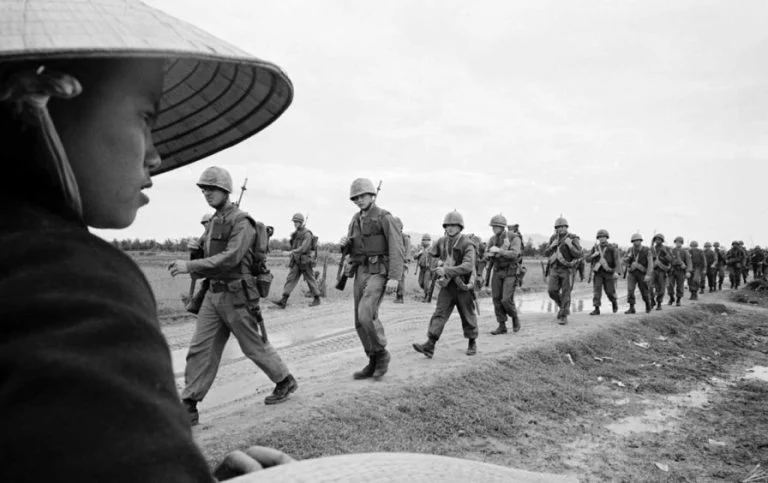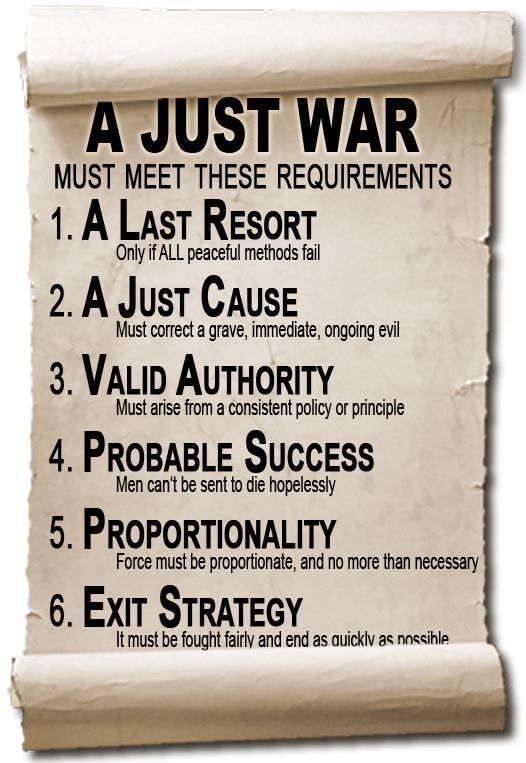“Just War” and Just War Theory
TMS PEACE JOURNALISM, 12 Jun 2023
Vladislav B. Sotirović | Global Research - TRANSCEND Media Service
4 Jun 2023 – One of the most disputed topics with regard to the concept of war is the idea of a Just War – a war held to be founded on the principles of justice in principle caused and conducted in the name of humanity like, for instance, self-defense or protection of minority groups, etc.
That was a phenomenon which is an inherent aspect of politics and foreign affairs, recognized even by Antique authors like classical Greek writers, as represented mostly by Thucydides and his famous History of the Peloponnesian War.
In the course of The Antiquity, the early Christians have been pacifists and, in fact, practiced abstention from the policy in general. At that time, the authorities of the almighty Roman Empire, once converted to Christianity in the 4th century A.D., in fact, have been forced to reconcile the pacifist philosophy of Jesus Christ with the demands of everyday real politics, war, and power on the ground from Britain to Egypt. A Christian philosopher and theologian St. Augustine (354−430) argued in De Civitate Dei that day-to-day acceptance of political realities was inevitable for all Christians living in the fallen world of the Roman Empire.
This topic was further developed by another Christian (Roman Catholic) philosopher and theologian St. Thomas Aquinas (c. 1225−1274), who made a distinction between Just and Unjust War by using two groups of criteria: 1) Jus ad bellum – the justice of the cause; and 2) Jus in bello – the justice of the conduct. By definition, Jus ad bellum is a just resource to war. It has to be based on certain principles that restrict the legitimate use of force. Jus in bello is the just conduct of war. It has to be founded on certain principles that stipulate how war should be fought.
These two elements of the Just War theory – just cause and just conduct – continued later up today to dominate the debate over the concept of war.
In the 20th century, “just” cause became narrowed to the issue of self-defense against aggression and helping the victims of aggression. Basically, the theoretical doctrine of just cause is concentrated on discrimination between combatants (soldiers) and non-combatants (civilians) and proportionality between the injustice suffered and the level of retaliation. However, the Total war, as both world wars have been, has strained, in effect, to the breaking point of the doctrine of Just War.
During the time of the Cold War, nuclear deterrence added an additional dimension to the debate for the reason that two opposite groups of thinkers became formed:
- The biggest number of political scientists and military experts on the concept of Just War have condemned nuclear war as Unjust War on several grounds: discrimination, proportionality, and no prospect of a successful outcome.
- However, some Christian thinkers considered the factor of deterrence: the threat to use nuclear weapons is morally acceptable. Some Roman Catholic clergy like the US Bishops have distinguished between 1) the mere possession of nuclear weapons, constituting a so-called existential deterrent (being acceptable); and 2) the real intention to use those weapons (being not acceptable).
In principle, the Just War theory is founded on the general idea that war can be justified and has to be understood and/or judged within the framework of fixed ethical criteria. In other words, a Just War is a war in which both final purpose and conduct meet certain ethical standards, and, therefore, can be (allegedly) treated as morally justified. Concerning such a definition of Just War, it is, basically, fluctuating between two theoretical extremes:
1) Realism, which is understanding war through the prism of realpolitik – the pursuit of power or self-interest.
2) Pacifism, which denies the existence of any war and violence which can be morally justified.
The Just War theory is, in fact, much more a topic of ethical and/or philosophical reflection and studies, rather than fixed political doctrine. Historically, the philosophical origins of the Just War theory are going back to the Roman philosopher Cicero. However, it became first systematically developed by philosophers and theologians St. Augustine, St. Thomas Aquinas, Francisco de Vitoria (1492−1546), and Hugo Grotius (1583−1645).
In the Just War theory, concerning the idea of Jus ad bellum, there are six basic principles to be respected regarding just resources for war:
- Last resort. It means that all sides have to try and exhaust all non-violent options (like diplomacy) before one of them decides to go to war in order that the use of force is going to be justified. This principle is, basically, the principle of necessity.
- Just cause. According to this principle, the purpose of war has to be to redress a wrong that has been suffered. Therefore, this principle is usually associated with the principle of self-defense as a response to a military attack (aggression). It is historically understood as the classic justification for war.
- Legitimate authority. This principle is understood that lawful war can conduct only legally constituted government (state’s authority) of a sovereign state, rather than a private individual or group (like a political movement). It means that the war in principle can be conducted only between sovereign states while all other „wars“ are going, in fact, to the category of military conflicts.
- Right intention. It requires that any war has to be conducted on the foundations of aims that are morally acceptable rather than revenge or the desire to inflict harm. Nevertheless, those morally acceptable aims of the war may or may not be the same as the just cause.
- Reasonable prospect of success. Accordingly, war has not to be conducted if the cause is, basically, hopeless, in which life is expended for no purpose or real benefit (for instance, the Phyric victory).
- Proportionality. This last principle of Jus ad bellum requires that warfare should result in more good than evil. In other words, any response to aggression should be measured and proportionate. For example, a wholesale invasion is not a justifiable response to a border incursion. From that viewpoint, for instance, the 2001 Afghanistan War was an unjustifiable response to the 9/11 attack. Nevertheless, the principle of proportionality is understood by many experts as macro-proportionality for the sake to distinguish it from the Jus in bello
In the case of warfare, however, there are three principles to be respected concerning Jus in bello or just conduct in war:
- Discrimination. Accordingly, the force has to be directed only at military targets, on the very grounds that civilians (non-combatants) are innocent. The injury or death inflicted on the civilian population is, however, and therefore, acceptable only if they are the accidental and unavoidable victims of deliberate attacks on legitimate targets. This phenomenon in war is usually nowadays called to be collateral damage – unintended or incidental injury or damage caused during a military operation. In practice, nevertheless, the term is used as a cynical euphemism in order to justify war crimes (for instance, ethnic cleansing can be a euphemism for genocide).
- This principle in overlapping with Jus ad bellum holds that the force used must not be greater than that needed to achieve acceptable military aims, and must not be greater than the provoking cause.
- Humanity. It requires that any force or torture must not be directed ever against captured enemy personnel (prisoners of war), wounded, or being under control. This principle is a part of formalizing the so-called Laws of War. One of the pioneers of international law who drew up conditions for a Just War that remained influential until today was Francis Suarez (1548−1617), a Jesuit theologian and philosopher of law, and in particular international law, called the last of the great scholastics.
_______________________________________________
Dr. Vladislav B. Sotirović is a former university professor in Vilnius, Lithuania. He is a Research Fellow at the Center for Geostrategic Studies.
Go to Original – globalresearch.ca
Tags: Direct violence, Just War, Structural violence, Warfare
DISCLAIMER: The statements, views and opinions expressed in pieces republished here are solely those of the authors and do not necessarily represent those of TMS. In accordance with title 17 U.S.C. section 107, this material is distributed without profit to those who have expressed a prior interest in receiving the included information for research and educational purposes. TMS has no affiliation whatsoever with the originator of this article nor is TMS endorsed or sponsored by the originator. “GO TO ORIGINAL” links are provided as a convenience to our readers and allow for verification of authenticity. However, as originating pages are often updated by their originating host sites, the versions posted may not match the versions our readers view when clicking the “GO TO ORIGINAL” links. This site contains copyrighted material the use of which has not always been specifically authorized by the copyright owner. We are making such material available in our efforts to advance understanding of environmental, political, human rights, economic, democracy, scientific, and social justice issues, etc. We believe this constitutes a ‘fair use’ of any such copyrighted material as provided for in section 107 of the US Copyright Law. In accordance with Title 17 U.S.C. Section 107, the material on this site is distributed without profit to those who have expressed a prior interest in receiving the included information for research and educational purposes. For more information go to: http://www.law.cornell.edu/uscode/17/107.shtml. If you wish to use copyrighted material from this site for purposes of your own that go beyond ‘fair use’, you must obtain permission from the copyright owner.
2 Responses to ““Just War” and Just War Theory”
Read more
Click here to go to the current weekly digest or pick another article:
TMS PEACE JOURNALISM:


“Just war” is offensive for all the reasons indicated. However more intriguing for me is an extension of that dubious framework to “just suffering”. This merits attention as argued separately: Just suffering theory? https://www.laetusinpraesens.org/docs20s/dieoff.php#just
Peace Education: An Alternative to War Education
EDUCATION, 13 Jun 2022
Dr. Surya Nath Prasad – TRANSCEND Media Service https://www.transcend.org/tms/2022/06/peace-education-an-alternative-to-war-education/
UCN News Channel
A Dialogue on
Universal Peace Education
For Peace and Violence
By Surya Nath Prasad, Ph.D.
https://www.youtube.com/watch?v=LS10fxIuvik